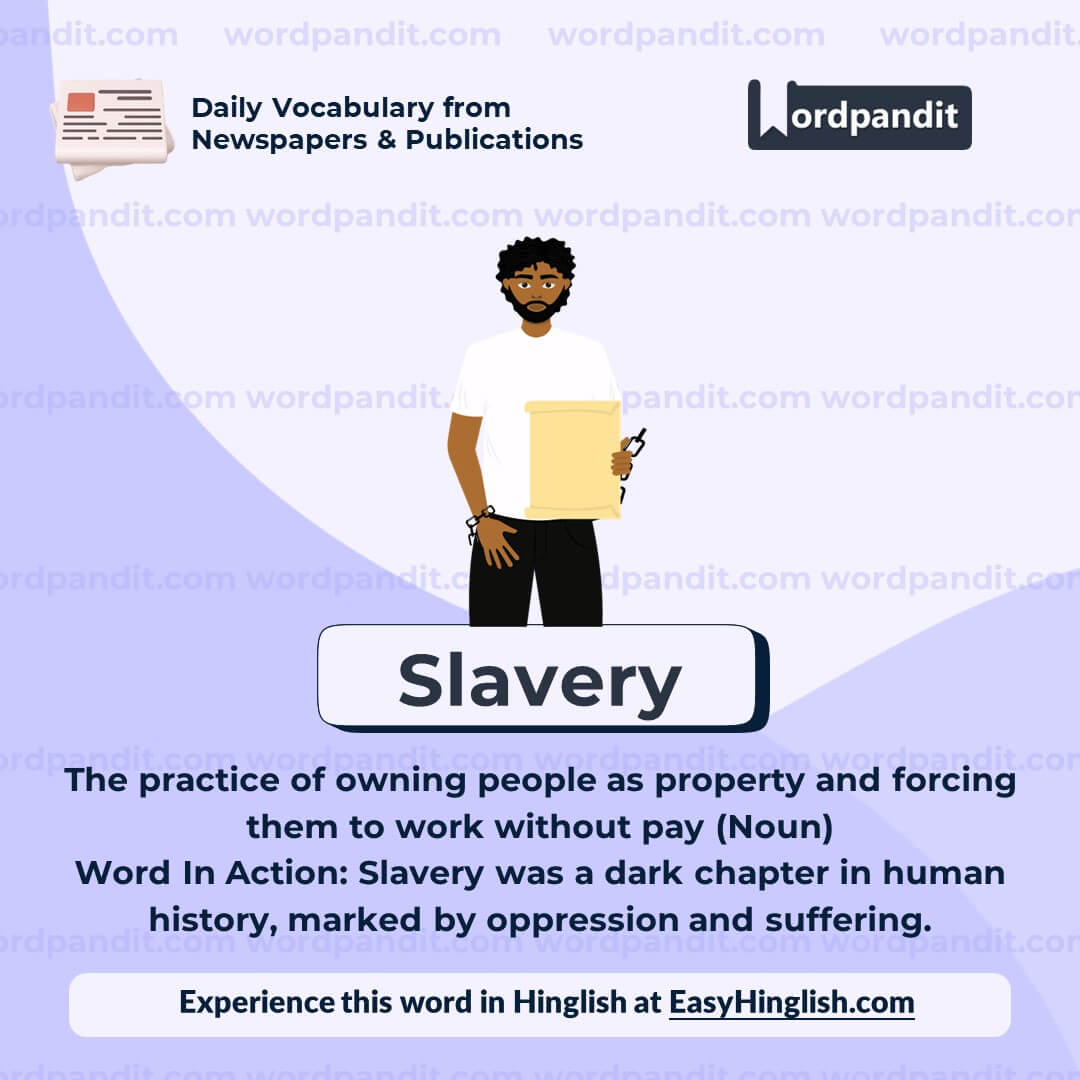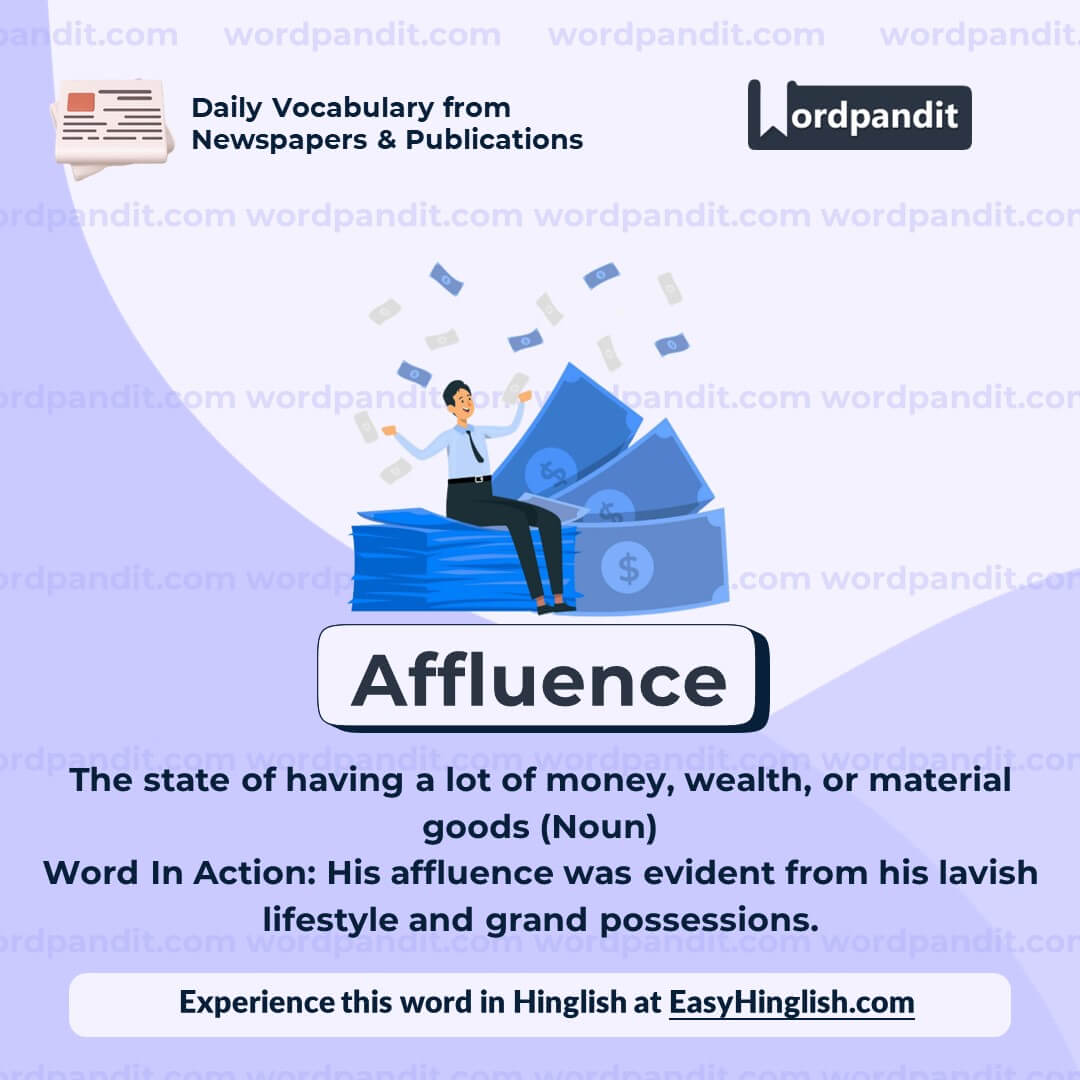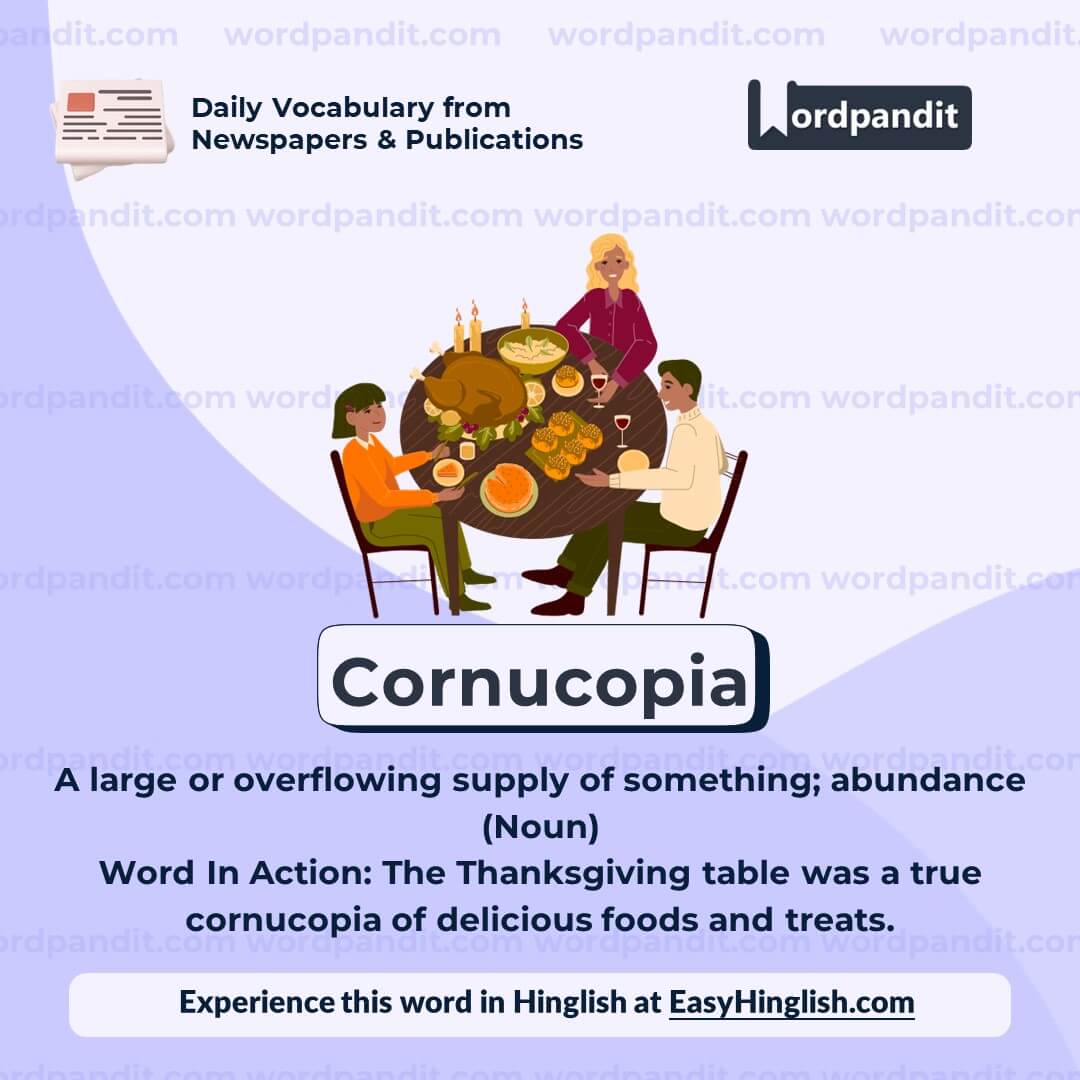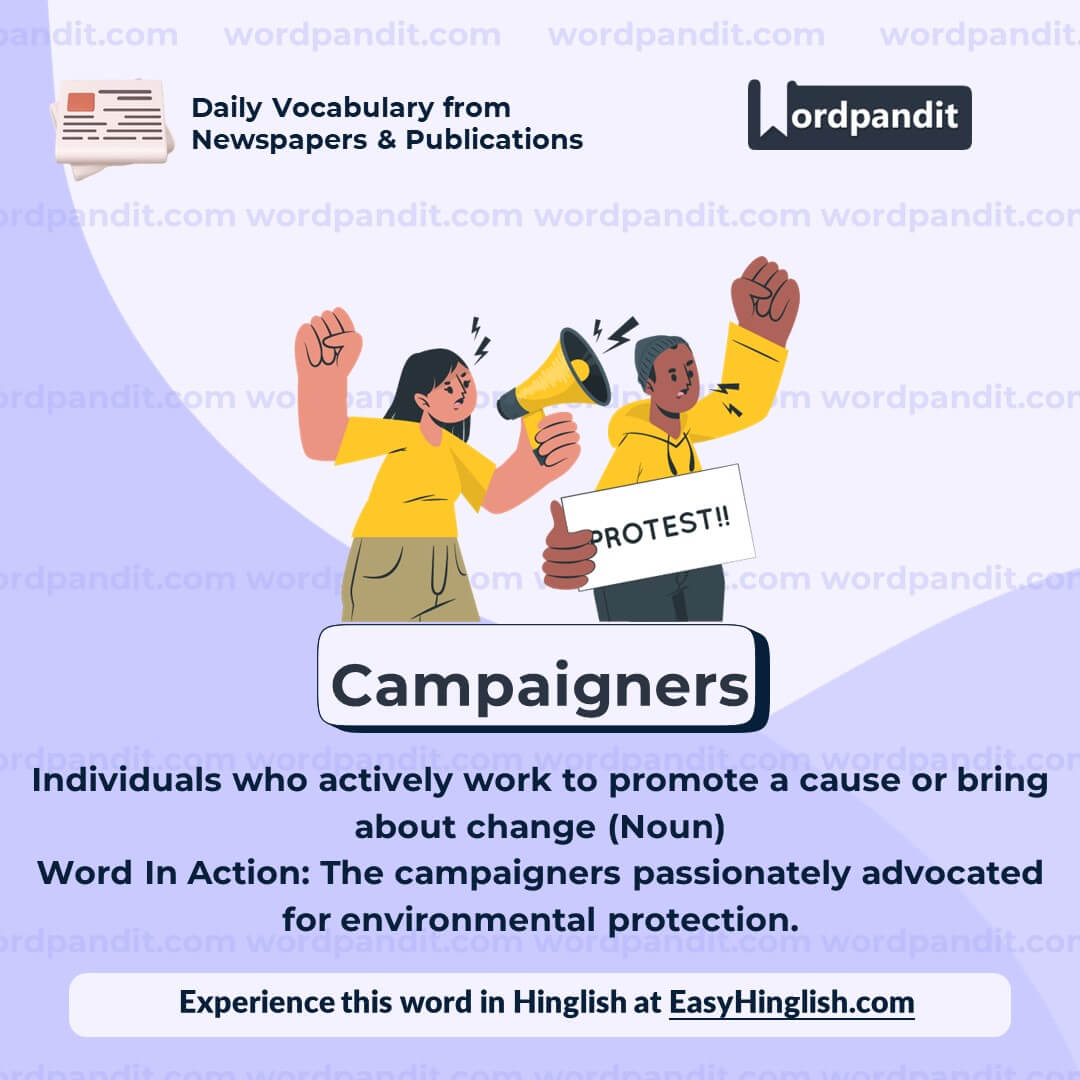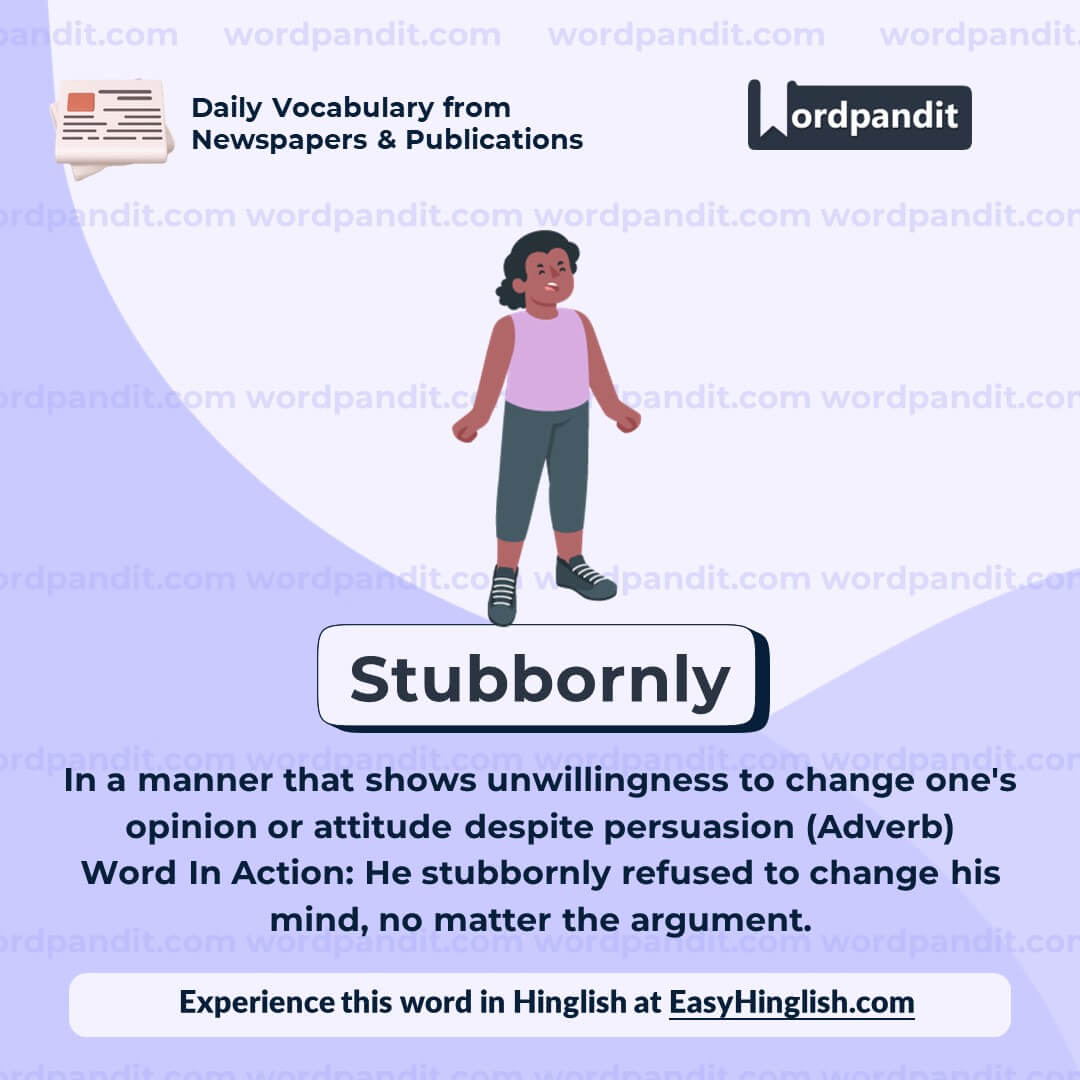Daily Vocabulary from International Newspapers and Publications
Expand Your Vocabulary with Wordpandit’s Global Vocabulary Hub
At Wordpandit, we are committed to helping you develop a truly global vocabulary by drawing from some of the most respected international publications. This section is designed to keep you ahead of the curve by introducing you to words that define global conversations and trends.
The Power of Global Sources
To help you think and communicate on a global scale, we curate vocabulary from renowned international sources, such as:
- The New York Times
- The Washington Post
- BBC
- The Guardian
- The Economist
- Scientific American
- Psychology Today
- And many more...
Stay Global, Stay Competitive
Our daily updates from international publications ensure you are consistently exposed to new words that reflect global news and developments, making sure your vocabulary is not only current but also globally relevant.
Enhance Your Global Perspective
Whether you’re preparing for international exams, aiming to excel in global business communication, or want to enhance your language skills for personal growth, Wordpandit offers the resources you need to thrive in a global context.
Effective Learning, Global Reach
Our learning methodology combines global examples, memory aids, and interactive activities, allowing you to internalize new words effectively and apply them in real-world scenarios.
Begin Your Global Vocabulary Journey Now!
Why Choose Wordpandit?
Practical Learning: Focus on words you'll actually encounter in real-world reading, enhancing your comprehension and communication skills.
Diverse Content: From current affairs to scientific breakthroughs, our varied sources expose you to vocabulary across multiple domains.
Effortless Integration: Make Wordpandit a part of your daily routine. Just a few minutes each day can significantly boost your lexicon over time.
Your Path to Vocabulary Mastery
- Visit our Daily Vocabulary section regularly
- Explore new words and their usage in context
- Practice incorporating these words into your own writing and speech
- Track your progress as your vocabulary expands
Start Your Journey Today
Embark on your vocabulary enhancement journey with Wordpandit. By consistently engaging with our daily posts, you'll build a robust vocabulary that serves you well in academic, professional, and personal contexts.
Remember, a word a day keeps linguistic limitations at bay. Make Wordpandit your daily companion in the quest for vocabulary excellence!
WORD-1: Slavery
Context:
"The time of his writing in 1865, had escaped slavery in Tennessee and was living in freedom in Ohio." - Aeon
Explanatory Paragraph:
Slavery refers to the condition in which individuals are owned by others, deprived of personal freedom, and forced to work without compensation. Historically, it has existed in many societies, but the transatlantic slave trade and the enslavement of Africans in the Americas are some of the most well-known examples. The abolition of slavery in different nations marked a significant step towards human rights and equality.
Meaning: The practice of owning people as property and forcing them to work without pay (Noun).
Pronunciation: SLAY-vuh-ree
Difficulty Level: ⭐⭐⭐ Intermediate
Etymology: Derived from the Middle English word "sclaverye," which came from Old French "esclavérie," referring to the condition of being enslaved, originally associated with Slavic people who were often enslaved in medieval Europe.
Synonyms & Antonyms:
Synonyms: Bondage, servitude, oppression, subjugation, captivity
Antonyms: Freedom, emancipation, liberty, independence
Usage Examples:
- Slavery was officially abolished in the United States with the ratification of the Thirteenth Amendment in 1865.
- The history of slavery and its lasting effects continue to shape discussions on racial inequality today.
- Many abolitionists dedicated their lives to ending slavery and ensuring human rights for all.
- Although legal slavery has ended, some forms of modern slavery, like human trafficking, still exist.
Cultural Reference:
"Slavery is the next thing to hell." - Harriet Tubman
Think About It:
How has the legacy of slavery influenced modern societies, and what can be done to address its long-term effects?
Quick Activity:
Research and list three major events that contributed to the abolition of slavery in different parts of the world.
Memory Tip:
Remember "slavery" by associating it with the word "slave," which refers to a person forced into labor without freedom.
Real-World Application:
Studying the history of slavery helps us understand the importance of human rights, social justice, and the need to fight against modern forms of exploitation.
WORD-2: Affluence
Context:
"Who are poor are all around us. Poverty exists in every community, often lives right next door to (or in the houses of) those with immense affluence." - Aeon
Explanatory Paragraph:
Affluence refers to having a great deal of wealth, material goods, or financial resources. It signifies prosperity and a high standard of living, often contrasted with poverty. Affluent individuals or societies have access to luxurious lifestyles, quality education, and better healthcare, but affluence also raises discussions about wealth inequality and social responsibility.
Meaning: The state of having a lot of money, wealth, or material goods (Noun).
Pronunciation: AF-loo-uhns
Difficulty Level: ⭐⭐⭐ Intermediate
Etymology: Derived from the Latin word "affluentia," meaning "flowing abundantly," from "affluere" (to flow towards), which metaphorically represents wealth and prosperity.
Synonyms & Antonyms:
Synonyms: Wealth, prosperity, opulence, richness, abundance
Antonyms: Poverty, scarcity, destitution, deprivation
Usage Examples:
- His affluence was evident in his luxurious home, designer clothing, and extravagant vacations.
- The documentary explored the stark contrast between affluence and poverty in major cities.
- Despite his affluence, he remained humble and dedicated to charitable work.
- Economic policies often determine how affluence is distributed within a society.
Cultural Reference:
"The greatest good you can do for another is not just share your riches, but reveal to them their own." - Benjamin Disraeli
Think About It:
Does affluence always lead to happiness, or can it sometimes create its own set of problems?
Quick Activity:
List three advantages and three disadvantages of living in affluence.
Memory Tip:
Think of "affluence" as "a-flow-of-wealth," symbolizing the steady stream of money and resources.
Real-World Application:
Understanding affluence helps in discussions about wealth distribution, social responsibility, and economic disparity, shaping policies that promote fairness and inclusivity.
WORD-3: Cornucopia
Context:
"There’s a reasonable chance that, instead of a cornucopia of explicit sex, your browser showed a paragraph of white text against a black background." - Aeon
Explanatory Paragraph:
The word "cornucopia" is often used to describe an abundant or overflowing supply of something. It originates from Greek mythology, where the "horn of plenty" was a magical goat’s horn that provided an endless supply of food and drink. In modern usage, it can refer to a vast variety of items, experiences, or ideas that are plentiful and diverse.
Meaning: A large or overflowing supply of something; abundance. (Noun)
Pronunciation: kor-nuh-KOH-pee-uh
Difficulty Level: ⭐⭐⭐ Intermediate
Etymology: From Latin *cornu copiae* meaning "horn of plenty," which comes from Greek mythology.
Synonyms & Antonyms:
Synonyms: abundance, profusion, plenty, plethora, overflow
Antonyms: scarcity, lack, deficiency, shortage
Usage Examples:
- The buffet offered a cornucopia of delicious dishes from around the world.
- The library was a cornucopia of knowledge, filled with books on every subject imaginable.
- During the holiday season, stores display a cornucopia of festive decorations and gifts.
- The internet provides a cornucopia of information, making it easy to learn about any topic.
Cultural Reference:
"The cornucopia is often used as a symbol of prosperity and abundance in art and literature, especially in harvest festivals and Thanksgiving celebrations." - Encyclopedia Britannica
Think About It:
Can you think of an area in your life where you have a "cornucopia" of resources, ideas, or opportunities?
Quick Activity:
Write a short paragraph describing a place you’ve visited that felt like a "cornucopia" of experiences, sights, or flavors.
Memory Tip:
Remember "cornucopia" by breaking it down: "cornu" (horn) + "copia" (plenty). Imagine a horn overflowing with food to symbolize abundance.
Real-World Application:
The word "cornucopia" is often used in business, education, and entertainment to describe a vast array of choices or resources, such as a cornucopia of investment options, academic courses, or movie selections on a streaming platform.
WORD-4: Campaigners
Context:
"The judgement has been met with anger, as activists, lawyers and campaigners renew their calls to criminalise marital rape in India." - BBC
Explanatory Paragraph:
The word "campaigners" refers to people who actively work towards bringing about social, political, or environmental change. These individuals advocate for causes, raise awareness, and push for reforms through various means, such as protests, petitions, and lobbying. Campaigners can be involved in human rights, climate change, public health, or other pressing issues.
Meaning: Individuals who actively work to promote a cause or bring about change. (Noun)
Pronunciation: kam-PAYN-erz
Difficulty Level: ⭐⭐⭐ Intermediate
Etymology: Derived from the word "campaign," which originates from the Latin *campus* (field) and later evolved in French and English to mean organized efforts towards a goal.
Synonyms & Antonyms:
Synonyms: activist, advocate, reformer, protester, lobbyist
Antonyms: bystander, passive observer, opponent
Usage Examples:
- Environmental campaigners have urged governments to take immediate action against climate change.
- Animal rights campaigners protested outside the factory to demand better treatment of livestock.
- Political campaigners worked tirelessly to encourage people to vote in the upcoming election.
- Health campaigners are raising awareness about the importance of vaccinations.
Cultural Reference:
"Throughout history, campaigners like Mahatma Gandhi and Martin Luther King Jr. have played crucial roles in fighting for justice and equality." - History.com
Think About It:
What is a cause you feel strongly about, and how could you contribute as a campaigner?
Quick Activity:
Research a famous campaigner in history and write a few sentences about their contributions.
Memory Tip:
Think of a "campaign" as an organized effort, and "campaigners" as the people leading that effort for change.
Real-World Application:
The word "campaigners" is commonly used in news reports, political movements, and social activism. Whether in elections, human rights, or environmental issues, campaigners play a vital role in shaping public opinion and influencing policy changes.
WORD-5: Stubbornly
Context:
"The controversial order has also brought back into the spotlight the issue of marital rape in a country which has stubbornly refused to criminalise it." - BBC
Explanatory Paragraph:
Stubbornly describes an action done with determination and resistance to change, often despite good reasons or opposing arguments. A person or entity acting stubbornly refuses to compromise, adapt, or accept new perspectives. While persistence can be a strength, stubbornness may sometimes prevent progress or rational decision-making.
Meaning: In a manner that shows unwillingness to change one's opinion or attitude despite persuasion (Adverb).
Pronunciation: STUH-burn-lee
Difficulty Level: ⭐⭐ Beginner
Etymology: Derived from the Middle English word "stoborne," meaning "unyielding," which is linked to the Old English "stibor," meaning "resolute" or "firm."
Synonyms & Antonyms:
Synonyms: Obstinately, persistently, rigidly, unyieldingly, doggedly
Antonyms: Flexibly, open-mindedly, willingly, compliantly
Usage Examples:
- He stubbornly refused to admit he was wrong, even when presented with clear evidence.
- Despite the storm, the hikers stubbornly continued their journey up the mountain.
- She stubbornly held onto her outdated beliefs, resisting any discussion of modern ideas.
- The country has stubbornly resisted international pressure to reform its policies.
Cultural Reference:
"You are never too old to set another goal or to dream a new dream, unless you stubbornly refuse to try." - C.S. Lewis
Think About It:
When does stubbornness become a strength, and when does it turn into a weakness?
Quick Activity:
Write a short paragraph about a time when being stubborn helped or hurt you in a situation.
Memory Tip:
Think of a mule—an animal known for its stubborn nature. If something is done "stubbornly," it is done with the same unwillingness to change!
Real-World Application:
Understanding when to be firm and when to be flexible is crucial in leadership, relationships, and decision-making processes.



